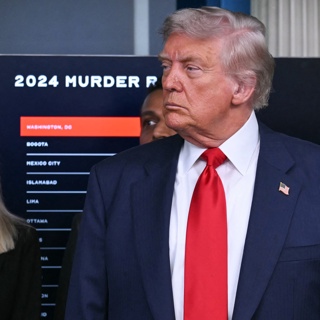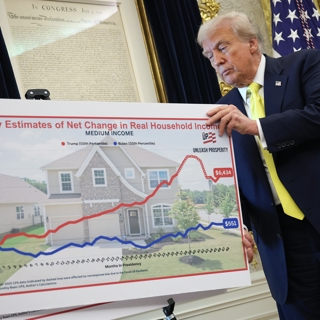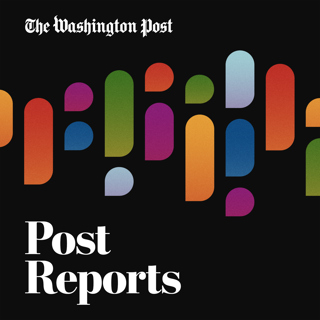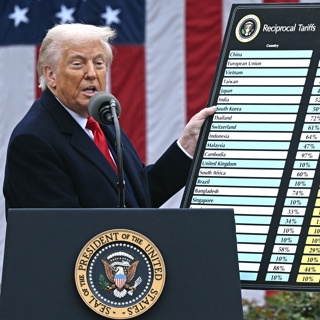
What Trump’s D.C. police takeover means
On Monday morning, President Donald Trump announced that he is putting Washington, D.C., under federal control and deploying the National Guard to fight crime. While police data shows a drop in violent crime in D.C. in recent years, Trump said this historic action would “rescue our nation’s capital from crime, bloodshed, bedlam and squalor and worse.” He suggested he could deploy the National Guard in other cities as well, referencing the deployment of Guard troops in Los Angeles earlier this year. Host Colby Itkowitz speaks with local reporter Olivia George about this unprecedented move to militarize Washington, D.C.; how some of the city’s residents are already protesting; and what this deployment could mean for cities across America.Today’s show was produced by Sabby Robinson, with help from Laura Benshoff and Rennie Svirnovskiy. It was edited by Reena Flores and mixed by Sam Bair. Subscribe to The Washington Post here.
11 Aug 19min

Trump's battles with data, DC, and world trade
In the past week, President Donald Trump has imposed sweeping tariffs on dozens of countries – and made moves to suppress signs of a weakening economy. Today on the politics roundtable, host Colby Itkowitz speaks with White House reporter Emily Davies and senior national political correspondent Naftali Bendavid about how Trump’s recent economic moves are playing politically. They also cover his recent threats to take federal control of D.C., and the latest on how the Justice Department is pursuing investigations into Trump’s perceived political enemies.Today’s show was produced by Arjun Singh. It was edited by Laura Benshoff and mixed by Sean Carter. Subscribe to The Washington Post here.
8 Aug 24min

Trump’s tariffs are finally here. Now what?
David Lynch covers trade for The Post, and he joins us to explain how the tariffs will affect consumer prices and the broader economy. David is the author of the forthcoming book “The World’s Worst Bet: How the Globalization Gamble Went Wrong (And What Would Make It Right).”Today’s show was produced by Sabby Robinson. It was edited by Maggie Penman with help from Reena Flores. It was mixed by Sam Bair. Subscribe to The Washington Post here.
7 Aug 25min

What an oncologist wants us to know about everyday chemicals
Endocrine disruptors are chemicals that can interfere with the complex system that produces and interacts with our hormones. Research suggests they can affect the reproductive system, our kidneys, and even increase our risk of cancer. There are over 1,000 types of endocrine-disrupting chemicals, according to some estimates, and we are exposed to them daily through things like kitchen utensils and makeup. So how worried should we be about inevitable exposure?Host Elahe Izadi speaks with oncologist Dr. Mikkael Sekeres about the connection between endocrine disruptors and cancer. Dr. Sekeres also shares his advice on steps he takes to avoid these chemicals–and how he puts the risks into perspective.Today’s show was produced by Thomas Lu, with help from Rennie Svirnovskiy, who also mixed the episode. It was edited by Ariel Plotnick. Subscribe to The Washington Post here.
6 Aug 26min

Democrats are ready to fight dirty over Texas
President Donald Trump is asking for five more Republicans in the House of Representatives, and Texas Gov. Greg Abbott is trying to give them to him. Last week, Republicans in the state’s legislature demanded they redraw Texas’ 38 congressional districts in a way that would effectively create five more safely red seats. If passed, the new map could give Republicans a major advantage in maintaining control of the House of Representatives in 2026.But in a stunning move, Democrats in the state legislature fled Texas and temporarily foiled the Republican plot. Now, Democrats across the country are openly asking whether they should emulate Texas Republicans and politically alter their own congressional districts to boost Democratic strength in Congress. Today on “Post Reports,” Colby Itkowitz sits down with Patrick Marley, who covers voting issues for The Post, to discuss why the standoff in Texas could mark a fierce new era in American politics.
5 Aug 20min

The government is paying 154,000 people not to work
This spring, the Trump administration and Elon Musk’s U.S. DOGE Service drastically reduced the federal workforce, all in the name of cost-cutting. This included making a “deferred resignation” offer to government workers, offering to pay them through at least the end of September if they resigned their positions. Post reporter Meryl Kornfield and colleagues have been trying for months to find out exactly how many federal employees took these buyouts. Last week, they reported for the first time that the government is now paying more than 154,000 people not to work. Colby Itkowitz speaks with Meryl about how she and her colleagues uncovered this number, how the Trump administration defends its claims of cost-cutting, and how former federal workers are feeling as they continue to earn a paycheck for work they are not doing. Today’s show was produced by Peter Bresnan. It was edited by Maggie Penman and mixed by Sean Carter. Subscribe to The Washington Post here.
4 Aug 15min

Deep Reads: Cracks in the dream
The Vitals had settled in Springfield from Haiti during President Donald Trump’s first term and saved money through the Biden administration. Business leaders in their reliably red county praised immigrants for reviving the local economy. Americans struggled to pass drug tests, one factory boss told a TV news crew. Not Haitians.Fernande Vital earned $21 an hour at a Japanese automotive plant, monitoring robots forging car parts, while her husband, Rocher, led a strip-mall church. Even as the GOP and some of their neighbors called for mass deportations, the Vitals were sure nobody meant them, immigrants here legally.So inJuly of last year, they made a down payment of $8,000, their entire nest egg. In August, they moved in, installed lace curtains and hung a family portrait in the dining room. One month later came the cracks.This story follows the Vitals after they dealt with the structural woes in their home and their feeling of belonging in this country.Danielle Paquette reported, wrote and narrated the piece. Bishop Sand composed music and produced audio.Subscribe to The Washington Post here.
2 Aug 24min

What Trump wants: More tariffs, less Epstein
After months of threats, the Trump administration announced this week a slew of heavy tariffs, taxes on imported goods, for major trading partners such as India and Canada. The news came on the heels of the recent announcement of a new trade agreement with the European Union that was widely seen as a lopsided deal in favor of the United States. Despite angst over President Donald Trump’s tariffs and aggressive approach to trade policy, major trading partners do appear to be ceding some ground to Trump. But how will these policies risk damaging alliances that are already frayed? And how could Trump’s latest trade moves affect U.S. consumers?Today on “Post Reports’s” weekly politics roundtable, host Colby Itkowitz is joined by Washington Post White House reporter Cat Zakrewski and global economics correspondent David Lynch to discuss the consequences of Trump’s tariffs.
1 Aug 27min






















